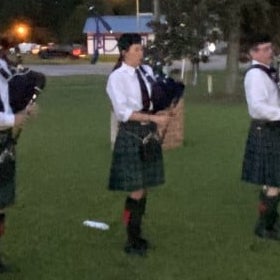Meghan Hutchins: Inspired by the Sea

I got married by a bagpipe-playing sea captain in Maine. After the ceremony, the sea captain shared with me how I could learn the pipes: get a practice chanter, Green Book, and join a band.
I started piping because I was looking for an unusual hobby. Something I could spend time working on everyday. I missed the process of focused learning.
Bagpipes are unusual (compared to say, guitar) and seemed really difficult. I like proving to myself that I can do a thing that is unusual and difficult.
Also, my dad used to play bagpipe music in the car when I was a kid and it drove my mom nuts... not sure if that had anything to do with it though...
My first struggle was playing on the beat with my practice chanter. Tapping my foot to the beat while playing was also an issue.
Tuning my practice chanter... nobody ever told me to do that - I didn't even know that was a thing for a long time.
When I got the pipes, I had no idea how strong the reed should be, I struggled with a too hard reed for months.
I lived in a small apartment above shops, so I had to walk 15 minutes into the woods each morning to practice. Not a struggle necessarily; it became part of my morning routine which I enjoyed. I did this almost every day for 3 years straight!
I was really focused on getting drone reed calibration right for a long time and it took a lot of practice (which I weirdly enjoyed). Totally worth it as I see the value!
I found the Dojo in 2015 when doing a Google search about learning bagpipes. The folks in the live classes contribute to the learning vibe and create sense of community - like we are all in this together.
The Discord Server has also proven to be a great idea to create a sense of community. A bold move that paid off!
Egos seem to be checked at the door at the Dojo. This is such an important factor for creating a community that feels safe and welcoming. Some pipers have strong "know-it-all" personalities that can be incredibly disruptive. The Dojo community seems to be super chill and supportive with very little policing.
I can say with 100% confidence that the Dojo has been the single greatest influence on my piping. It takes the mystery out of the bagpipes, making things concrete and objective. I appreciate the straightforward, radically candid feedback geared toward my own level.
When I first got my pipes, I could not play them. They came with a medium Gilmore reed that I couldn't even mouth-blow and I was scared to touch my drone bridals.
The 4 Questions is something that I do every time I pick up my pipes. And I'll do a deep dive into the 4 Questions every month or so.
Drone Reed Calibration was an absolute game changer! And I wish I knew about the Scotland the Brave Test when I first got my pipes.
The tune building method is amazing. And analyzing the tune before diving in is also super beneficial.
I used to (and sometimes still do) mark my music up and color-code the sections to get a better "mapping" of the tune. I also put arrows above where the beats go.
After taking the "Rhythm for Bagpipers" course, I now understand the different types and feels of different tunes. That's been a game changer as well.
I'm on a constant look out for crossing-noises and clean gracenotes / embellishments.
I can hear when something is sloppy in my own playing and I can slow things down and use a metronome to clean things up.
I began to realize early on that the Dojo doesn't just teach bagpiping, the Dojo teaches fundamental life skills through bagpiping.
I've learned about leadership, giving feedback, asking questions to get people thinking, use of analogies to get concepts to stick ("hot potato"), persistence, commitment, patience, valuing a learners mind and that humble pie is delicious! I watch The Karate Kid with a whole new mindset now.
I'm trying to pay all this back with the new students in my band. To be supportive and encouraging even though I'm still a beginner myself. I know that without the Dojo and Ailidh, I'd certainly be in a different place with my piping.
One great side-effect of piping is finding connection and purpose.
Meghan Hutchins, Virginia, USA




